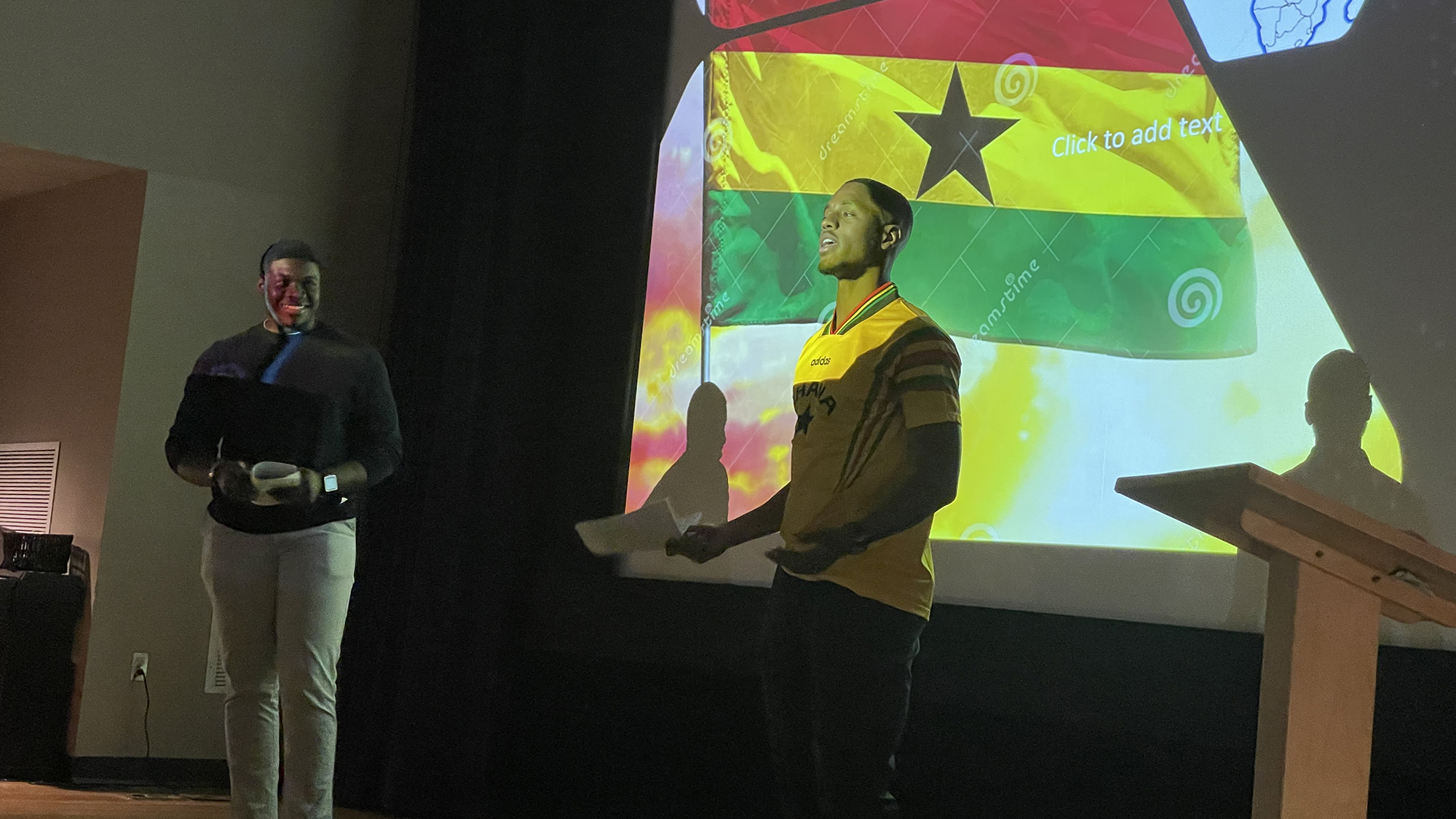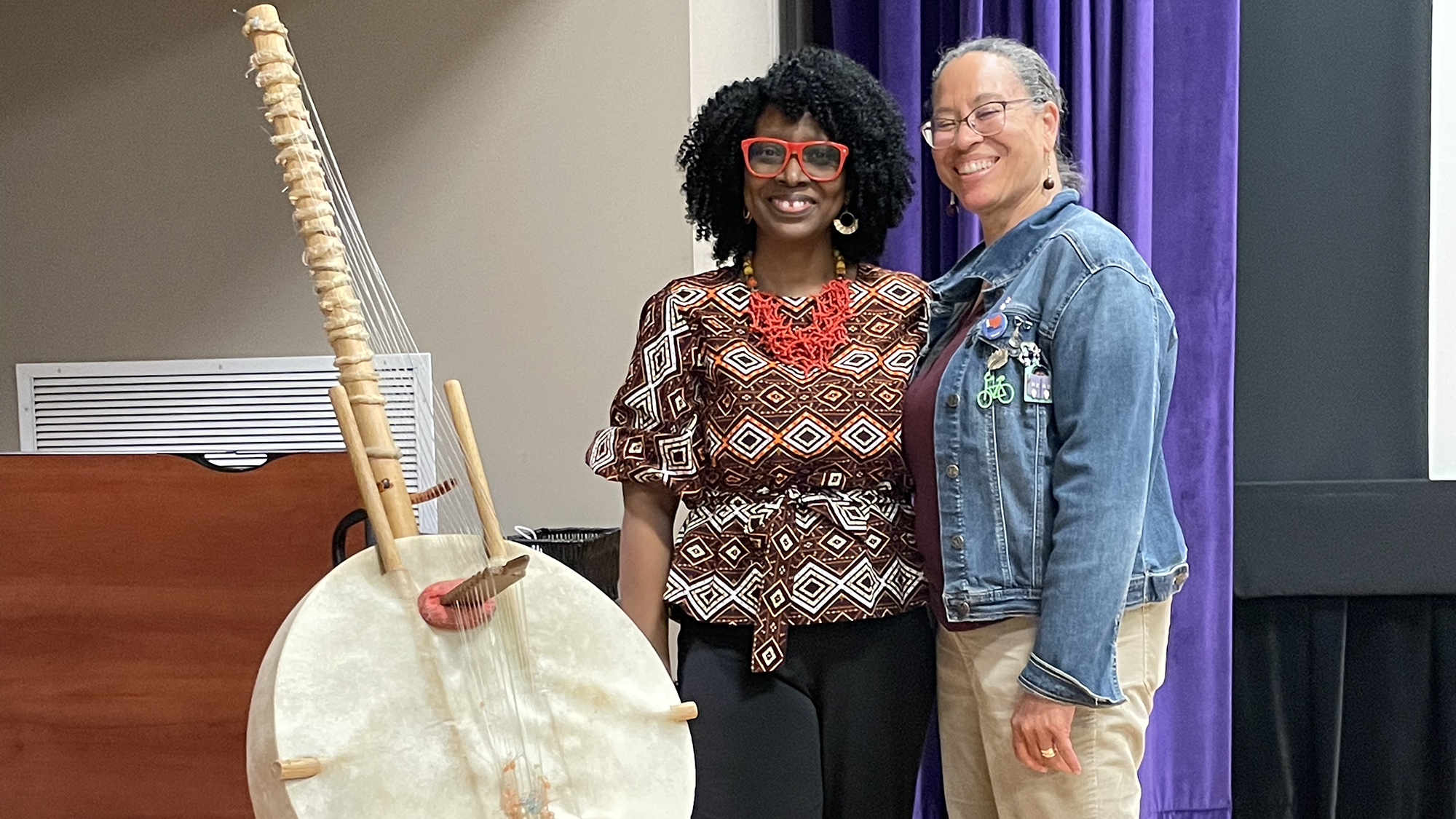African students share cultures and invite understanding
“Africans Do Not All Look Alike.”
So reads the poster for an event organized by Furman’s Afrikiya student organization.
The pervasive ignorance that prompts the need for such a statement was just one of the lessons learned by those who attended a Cultural Life Program about the diversity of African countries represented at Furman. Attendees also heard from some of Furman’s African students about the distinct cultural traditions in food, dance, spoken word, history and economies of their respective homelands.
Soukeyna Pitroipa Djahira ’25 spoke of her life in Burkina Faso and gave a cultural overview of her home city, Ouagadougou.
“For me, it meant a lot to show my culture to the Furman community because not everyone knows where Burkina Faso is located or even knows that it is a country in Africa – plus my culture isn’t mainstream,” said Djahira, who is a Hearst Fellow and participates in Afrikiya, the Furman Student Activity Board and Furman’s International Student Association. “Presenting about my home country was a way to enlighten people on my African experience and, in addition, to empower the voices of my Burkinabe people.”
For Ellis Edinkrah ’25, a physics and applied mathematics double major, “it was an exhilarating experience,” to introduce his classmates to his home country of Ghana. Edinkrah is a Hearst Fellow and member of the Society for Physics Students, the First-Generation Students Association and the Furman University International Students Association.
“It was lovely to see so many people enthusiastic about learning about different cultures and norms,” Edinkrah said. “And indeed, I did enjoy presenting at the event.” Among his facts:
- Ghana is a country in West Africa with a population of 31 million people.
- It is the second-largest producer of the world’s cocoa.
- It is also the second-largest producer of gold in Africa and was nicknamed the Gold Coast by the British who were the then colonial masters.
- Morocco, Kenya and Ghana were the fastest-growing major economies in Africa in 2021.
The revitalized student group, formally known as Baba Africa, now known as Afrikiya, sponsored the presentation on the African international student experience at Furman on March 24. Janet D. Kwami, an associate professor of communication studies, and Laura Baker, an outreach librarian and Pathways advisor, facilitated the event.

From left: Ellis Edinkrah ’25 and Ivan Agyaakwah ’25 during the CLP
A reshaping of narratives
Jake Raine, a sophomore majoring in business, learned that various African nations place cultural meaning in distinctive fabrics unique to each nation, and compared the tradition to the absence of such a practice in his home country of England.
“Each of the 54 countries in Africa individually have so much to offer, and the naiveté of the rest of the world is extreme, myself included,” he wrote in a reflection piece afterward. “(We) should all make a conscious effort to broaden our horizons and learn more about each individual country and stop treating that massive, beautiful continent as one big country!”
Like Raine, Lola Reyes ’22, said the presentation by African students taught her not only about African nations but made her aware of false and dangerous narratives.
“I began thinking a lot about how the world abroad, and Africa specifically, is presented in America,” wrote Reyes in her reflection piece. “It is always presented as very poor, dirty, and homogenous, when that is simply not the case.”
Perceptions of ‘others’
Kwami said such events give students a historical, social, political and cultural lens to understand Africa’s diversity and help to cultivate world citizenship by developing a better understanding of those who are different from them.
“It provides the opportunity for students to reflect upon practices that contour their perceptions of ‘others’ by centering African students’ culture and self-representation in an effort toward engaging students in the appreciation of the diversity and rich culture African students bring to Furman’s campus,” said Kwami.
“The goal here is to enhance intercultural dialogue and encourage social inclusion of underrepresented groups on campus. I believe such intercultural interactions and dialogue among students give voice to underrepresented students, more specifically African students on campus, to share with pride their cultural heritage as a central part of their identity.”

Associate Professor of Communication Studies Janet Kwami and Laura Baker, who is an outreach librarian and Pathways advisor, display a kora, an instrument that symbolizes storytelling and is usually played by a griot. A griot is a West African storyteller, singer, musician and oral historian. This kora is from the library’s Special Collections and Archives, where it is on loan. It belongs to South Carolina poet and internationally celebrated performer Kurtis Lamkin.